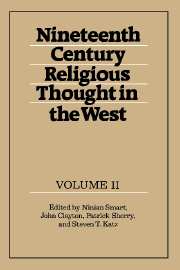Book contents
- Frontmatter
- Contents
- 1 SAMUEL TAYLOR COLERIDGE
- 2 RALPH WALDO EMERSON AND THE AMERICAN TRANSCENDENTALISTS
- 3 JOHN HENRY NEWMAN AND THE TRACTARIAN MOVEMENT
- 4 DREY, MÖHLER AND THE CATHOLIC SCHOOL OF TÜBINGEN
- 5 ROMAN CATHOLIC MODERNISM
- 6 RUSSIAN RELIGIOUS THOUGHT
- 7 BRITISH AGNOSTICISM
- 8 THE BRITISH IDEALISTS
- 9 WILLIAM JAMES AND JOSIAH ROYCE
- INDEX
3 - JOHN HENRY NEWMAN AND THE TRACTARIAN MOVEMENT
Published online by Cambridge University Press: 06 January 2010
- Frontmatter
- Contents
- 1 SAMUEL TAYLOR COLERIDGE
- 2 RALPH WALDO EMERSON AND THE AMERICAN TRANSCENDENTALISTS
- 3 JOHN HENRY NEWMAN AND THE TRACTARIAN MOVEMENT
- 4 DREY, MÖHLER AND THE CATHOLIC SCHOOL OF TÜBINGEN
- 5 ROMAN CATHOLIC MODERNISM
- 6 RUSSIAN RELIGIOUS THOUGHT
- 7 BRITISH AGNOSTICISM
- 8 THE BRITISH IDEALISTS
- 9 WILLIAM JAMES AND JOSIAH ROYCE
- INDEX
Summary
What is the Church of England? To ask that question was to ask a hundred others. Creeds, dogmas, ordinances, hierarchy, parliamentary institution, judicial tribunals, historical tradition, the prayer-book, the Bible – all these enormous topics sacred and profane, with all their countless ramifications, were swiftly swept into a tornado of such controversy as had not been seen in England since the Revolution [of 1688].
Thus John Morley, describing the ecclesiastical situation following the years marked by the repeal of the Test and Corporation Acts in 1828 and the passage of the first Reform Bill in 1832.
It is at first curious to be driven to note that the effect of the rage for reform should have been to stimulate Anglicans into a revival of the controversies that had divided Englishmen under Elizabeth, James and Charles, that had precipitated the Puritan rebellion, and that had gone to sleep in the eighteenth century. Men asked questions about church, prayer, grace, sacraments, priesthood, the authority of the Scriptures, that had been posed in the crisis of the Reformation, that had indeed been life-and-death matters down to the Civil War; now in the age of improvement, with gentler manners and more polished society and more prudish literature, the same questions were asked. But the resonance of the questions and their import for daily life were necessarily different. Indeed, the only place in England where one could almost think that the same debate was continued from the seventeenth century into the nineteenth was Oxford.
- Type
- Chapter
- Information
- Nineteenth-Century Religious Thought in the West , pp. 69 - 110Publisher: Cambridge University PressPrint publication year: 1985
- 1
- Cited by



